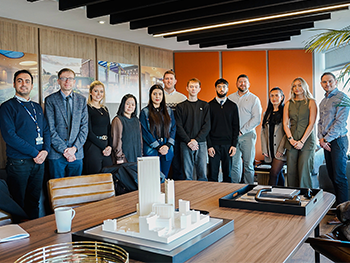University News Last updated 21 January

Five quantity surveying students at Birmingham City University (BCU) will take their careers to new heights thanks to the award-winning company building Birmingham’s tallest skyscraper.
Court Collaboration, which is constructing the 155-metre tall One Eastside on James Watt Queensway, will advise and guide the quintet to help prepare them for the workplace.
“We’re extremely proud to be launching this student mentoring initiative as part of our ongoing partnership with BCU,” said Court Collaboration CEO Alex Neale.
“It’s an honour to help nurture some of the next generation of professionals in this way.”
The students are undertaking final-year dissertations that closely align with critical issues in the construction and housing sectors.
These include the UK housing crisis, off-site manufacturing, cost assurance in construction, regulatory compliance, and contract management in social housing refurbishment.
“We’ve been inspired by the group’s knowledge and passion, so we’re very much looking forward to supporting them on their journey,” added Neale, a BCU graduate himself.
“These young minds will not only benefit Court Collaboration developments but will also go on to innovate and push boundaries across the entire industry, both regionally and beyond.”
Against a fitting backdrop of the Birmingham skyline, the students recently visited Court Collaboration’s offices in the city centre to present their research scope.
They were then matched with mentors who will provide insights and access to data, facilitate interviews, and guide them in shaping their dissertations to address real-world challenges.
“This collaboration develops mutual learning,” said Dr Saeed Talebi, Associate Professor in BCU’s College of Built Environment.
“Court Collaboration will gain impactful knowledge they can potentially utilise to create actionable solutions, while mentors gain fresh perspectives from the students' research.
“While our students will develop crucial problem-solving skills – finding innovative ways to address complex, practical problems – that will prepare them for future professional roles.”
Student Ria Curtis will focus her project on social housing repairs and maintenance.
“Working on a business brief will allow me to deepen my understanding of real-world challenges and develop my experience in the workplace,” she said.
“The combination of academic learning and practical application on my course is equipping me with the tools I need to take on greater responsibilities. I’m gaining the critical leadership and strategic thinking skills for my aspirations to become a Chartered Surveyor.”
This latest initiative builds on the work that BCU and Court Collaboration have already been doing together on the One Eastside project, which is due for completion in 2026.
They joined forces to create a virtual 3D model or ‘digital twin’ of the skyscraper that will use artificial intelligence to analyse data from air quality and energy consumption sensors to keep residents of the 667 apartments safe and healthy.
This aligns with the three core pillars of BCU’s newly launched 2030 Strategy:
- To create knowledge for good through student research, which will generate solutions to real issues in the housing sector;
- To develop talent for tomorrow by equipping students with employability skills and industry connections;
- To power prosperity by enabling a Birmingham business to make positive changes for the city, people, and the local economy.
Professor Nick Morton, BCU Associate Dean for the Faculty of Computing, Engineering, and the Built Environment, said: “BCU has made a strategic commitment to ‘Develop the Talent for Tomorrow’ in its new institutional strategy.
“Our partnership with Court Collaboration enables Built Environment students to work directly with industry at the cutting edge of knowledge and innovation. It also provides the best possible opportunity to nurture that talent for the future.”
Read more about the One Eastside research project.